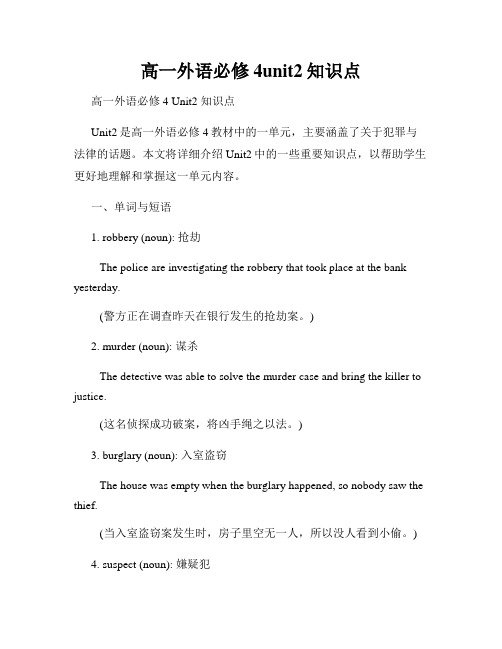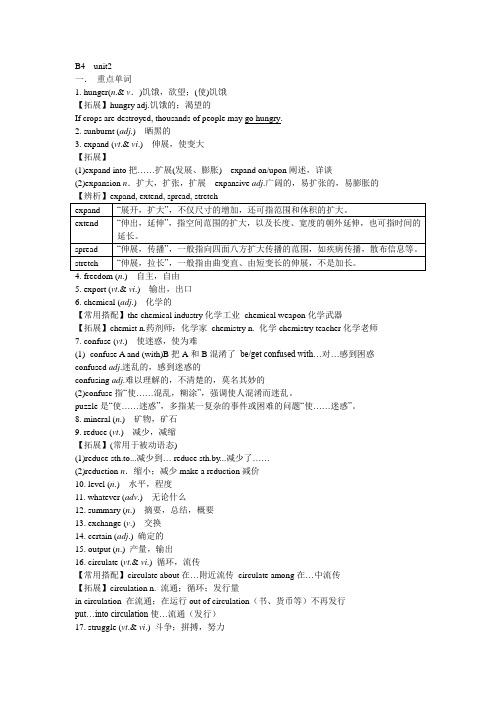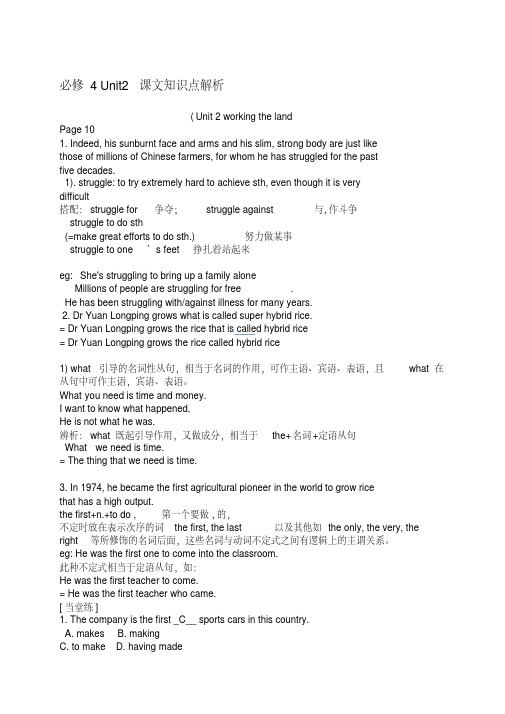高一英语必修四第二单元知识点总结
人教新课标高中英语必修4Unit2重点知识点汇总

人教新课标高中英语必修 4 Unit2重点知识点汇总Unit 2 Working the Land核心词汇1.struggle v.挣扎;努力;拼搏;斗争n. (为争取自由、政治权利等而进行的)斗争,奋斗【常用结构】struggle with 与……斗争struggle for 为争取……而斗争struggle against 与……斗争;为反对……而斗争struggle to do sth. (=make great efforts to do sth.) 努力做某事feet 挣扎着站起来struggle to one’sShe struggled to keep back the tears. 她努力忍住泪水。
It was a hard struggle to get my work done on time.为使工作按时完成, 我做了一番努力。
【易混辨析】struggle/fightstruggle 指较长时间的、激烈的斗争,往往指肉体及精神上的战斗。
fight 意为“搏斗,打斗,打架”,表示“斗争”时,包含体力和勇猛的因素。
2.expand v.扩大;扩展;增加;增长;(使)膨胀;阐述;使变大【常用结构】expand...into... 将……扩展/发展成……expand on 阐述;详谈He is thinking of expanding his business.他在正考虑扩大他的生意。
population expanded by 12%.In ten years the c ity’s十年之中,该市人口增加了百分之十二。
【联想拓展】expansion n.展开;膨胀;扩展expansive a dj.广阔的;易膨胀的【易混辨析】expand/extend/spread/stretchexpand 意为“展开,扩大”,不仅指尺寸的增加,还可指范围和体积的扩大。
extend 意为“伸出,延伸”,指空间范围的扩大,以及长度,宽度的向外延伸,也可指时间的延长。
高中英语必修4知识点unit2

Unit 2 Working the landI重点词汇1.struggl.vi.&n.斗争;拼搏;努力[典例]1).The.wer.strugglin.t.ge.ou.th.burnin.car.他们挣扎着从烧着的车里往外爬。
2).Th.boo.i.abou.thei.struggl.fo.liberation.这本书写的是他们为解放而作的斗争。
[词语归纳]struggle for 为……而斗争struggle with / against与……作斗争struggle to do sth.努力做某事straggle to one’ s feet挣扎着站起来a life-and-death struggle生死搏斗[练习] 按要求填空或翻译。
1).The.ar._______.(为……而斗争.th.position2).The.struggle.al.throug.th.year._____.u.______.th.Japanese.(介词)3).Th.fo.struggle._______.(escape).4).H.______.______.______.______.(挣扎着站起来.an.dragge.slowl.ahead.Keys.1).strugglin.for. 2).with.agains.. 3).t.escap.. 4).struggle.t.hi.feet2.equi.vt.&vi.配备;装. equipmen.n.[u.装备;设备[典例]1).The.equippe.themselve.fo.th.expedition.他们为远征治装。
2)catio.shoul.equi.yo.fo.life.有良好的教育能受用终生。
[重点用法]equi.sb./sth.wit.用……武装某人;用……装备某.equi.sb./sth.fo.为……而武装某人;为……而装备某.a piece of office equipment 一件办公设备[练习] 按要求填空或翻译。
高中英语必修四Unit2知识归纳

Unit 2 知识归纳词汇1.struggle v.&n.挣扎;努力;奋斗;斗争;艰难地进行(1)struggle to do sth.努力做某事;挣扎着做某事struggle against/with同……作斗争struggle to one’s feet挣扎着站起来struggle for 为……而斗争;努力争取……struggle on挣扎着,坚持下去(2)with a struggle 费劲地2.expand vt.& vi. 扩大,增加;使变大;使增强;使膨胀;阐述;细谈(1)expand into/in...使扩大,变大;把……扩展expand on/upon 阐述,详谈(2)expand...into...把……扩展/发展成……(3)expansive adj.易扩张的;易膨胀的;广阔的expansion n. 扩张;膨胀;扩大;发展Metals expand when they are heated.金属受热则膨胀。
同类辨析expand,extend,spread,stretch与enlarge(1)expand展开,扩大,使膨胀;不仅指尺寸的增加,还可指范围和体积的扩大。
(2)extend伸长,延伸,指空间范围等的扩大,以及长度、宽度的向外延伸,也可指时间的延长。
(3)spread伸开,传播,一般指向四面八方扩大传播的范围,如传播(疾病)、散布(信息)等。
(4)stretch伸展,拉长,一般指由曲变直、由短变长的伸展,不是加长。
(5)enlarge指面积、体积和范围的扩大以及能力的增长,不能用来指重量、速度、时间等。
3.equip vt.装备;配备(1)equip...for sth./to do sth.为了(做)……而装备……equip...with...用……装备……,使装(具)备equip oneself 整装,预备行装(2)be equipped for准备好,对……有准备be equipped with装(配)备;安装be fully/specially/poorly/well equipped装备齐全/独特/简陋/完好(3)equipment n.[U]装备;设备a piece of equipment (不可用an equipment)4.regret vt.惋惜;遗憾n.遗憾;懊悔(1)regret to do sth.(常和tell,say,inform等动词连用)对将要做某事表示遗憾regret doing sth.后悔做了某事regret+thatclause遗憾……(2)feel regret for对……感到后悔to one's regret令某人感到遗憾的是It's to be regretted that...令人遗憾的是……with great/deep regret很遗憾5.focus n.集中点,焦点,调焦;兴趣或注意力的中心vt.&vi.(使)聚焦,(使)集中精力于……(1)focus one's eyes/energy/mind/attention on sth.把某人的眼神/精力/思想/注意力集中于某物(2)focus on/upon sth.(某人)把注意力集中于某物(3)out of focus模糊不清/焦点没有对准的in focus清晰的/焦点对准的bring sth.into focus使……成为关注的焦点the focus of attention/concern注意力/关注的焦点6.reduce vt. 缩减,减少;使……处于……状态(表示此种意义时,常用于被动语态);使变弱;使降职(级)(1)reduce sth.(from sth.) to...把……减少到……reduce sth.(from sth.) by...把……减少了……be reduced to...沦落为……be reduced to despair 陷入绝望reduce sb.(from sth.) to...把某人(从某级别或职位)降至……(2)reduction n.减少,缩减;折扣;减价make a reduction减价(3)(反)increase v.增加,增长,增大7.comment n.&vi.评论,注释,意见(1)make comments on/upon sth.评论某事without comment不必多说no comment无可奉告(2)comment on/upon评论,谈论,对……提意见comment that...评论……He made several comments on the film.他对这部电影作出了许多评论。
高一外语必修4unit2知识点

高一外语必修4unit2知识点高一外语必修4 Unit2 知识点Unit2是高一外语必修4教材中的一单元,主要涵盖了关于犯罪与法律的话题。
本文将详细介绍Unit2中的一些重要知识点,以帮助学生更好地理解和掌握这一单元内容。
一、单词与短语1. robbery (noun): 抢劫The police are investigating the robbery that took place at the bank yesterday.(警方正在调查昨天在银行发生的抢劫案。
)2. murder (noun): 谋杀The detective was able to solve the murder case and bring the killer to justice.(这名侦探成功破案,将凶手绳之以法。
)3. burglary (noun): 入室盗窃The house was empty when the burglary happened, so nobody saw the thief.(当入室盗窃案发生时,房子里空无一人,所以没人看到小偷。
)4. suspect (noun): 嫌疑犯The police arrested a suspect in connection with the robbery.(警方逮捕了一名与抢劫有关的嫌疑犯。
)5. evidence (noun): 证据The detective collected a lot of evidence at the crime scene.(这名侦探在犯罪现场收集了大量的证据。
)二、被动语态在Unit2中,我们需要掌握被动语态的用法。
被动语态是表示主语是动作的接受者的一种句式。
构成被动语态的基本结构为:“be + 过去分词”。
例如:Active: The police caught the thief.Passive: The thief was caught by the police.被动语态常用于描述某一行为的执行者不明确或不重要的情况下。
必修四第二单元知识和语法讲解

必修四第二单元知识和语法讲解人教新课标:必修4 Unit2 单元重点辅导一、日常口语突破建议与应答①—How about going out for a walk after class?下课后出去散步好吗?—I‘d prefer to stay at home because it is raining. 因天下雨,我宁愿呆在家里。
②—Would you rather go to the movie tonight with us?你愿意今晚和我们一起去看电影吗?—I think I‘d better look after my sick father at home. 我想最好还是在家照顾生病的父亲。
二、核心单词例析1. struggle vi. & vt. 努力,拼搏,斗争struggle to do sth (=make great efforts to do sth.)努力做某事…he has struggled for the past five decades to help them.他在过去50年来一直在努力帮助他们。
She struggled to keep back the tears. 她努力忍住泪水。
搭配:struggle for争夺;struggle with /against同……斗争2. equip vi. & vt. 使(某人)具备条件;装备,配备(1)equip sb. for/to do sth.使某人具备做某事的条件,使某人能够做某事Your training will equip you for your future job. 你的训练使得你能够胜任将来的工作。
Your education will equip you to earn a good living. 你受的教育能够使你能谋上好生计。
(2)equip…with…用……装备……He equipped his bike with a head light. 他给自行车装上了前灯。
外研版高一英语必修4_Module2_单元知识总结

单元知识总结I必背短语:1 be connected with2 be stuck in3 share sth with sb4 in no time5 get around6 in the rush hour7 be limited to 8 have a good view of9 follow the same routes 10 under construction 11 be marked with /in 12 match A with B13 be worth doing 14 the advantage of sth 15 ask for 16 in the midde of17 prefer A to B 18 the ccause of19 in the opinion of sb 20 be reserved for21 be surprised ___ 22 go _____ doing23 switch off 24 stay/keep cool25 leave sth on 26 break the rules27 as a result 28 in a good mood29 divide sth into 30 no way31 drive sb mad 32 in mind33 by the end of 34 be reduced byII词类转换1 permit vt.___________ n .2 convenient adj.__________n.3 limit v._____________ adj _____________ n4 impressive adj.____________vt. ___________n.5 explore v._____________n.6 solution n. ____________v.7 registration n.____________v. 8 suburb n. __________adj.9 air-conditioned adj._____________ n.III 重点词语用法1 suburban ( suburb n. urban adj )2 get around = get round = get aboutBuses provide a cheap way to get around in DL.Do you know a better way of getting around the matter? get around to sth / doing sth3 match,搭配suit , 适合fit 合身4 means 手段----by means ofmethod 方法--- with the methodway 普通用语--- in the way of / thatmanner 行为方式---- in … manner5 how long , how often , how soon ,how far6 display display goods for sale ,display one’s angeron display7 permit n. You can’t open a store without a permit. v. permit sth / doing sth / sb to dowithout permission8 fare 车费taxi fare , half fare , a single farefee 酬金(给律师,医生,教育),入场费charge 索价,费用price 价格expense 支出,开支,津贴,经费(复数)cost代价,成本(用复数)9 impress sb .with sthsth on sbsth be impressed on sb10 tricycle, tricycle taxitricolour the tricolourtriangle, trilogy, trinity11explore v.We explored several solutions to the problems.Once they arrived in the town, they went out to explore. 12take advantage ofto sb’s advantage 对…有利gain/ get/ have/win an / the advantage over 胜过优于13follow the customfollow one’s advicefollow the fashionfollow the rulesas follows14be (well )worth + 金钱,精力be worthy of being done / n. ( 褒义词)to be doneIt’s worthwhile doing sth值得做。
必修4 unit2 知识点

3. for/in the past/last + 一段时间 (与现在完成时连用)
4. the first ……to do……第一个……的 I am the first student to come to classroom.
5. Make it possible to produce……
6. 百分比+ of + 名词(谓语动词的单复数取决于 名词的单复数)
7. Finding ways to grow more rice has been his life goal.
动名词做主语,谓语用单数
8. a disturbing problem
一个 令人烦恼的问题
1._____ Eating (eat) more fruit every day is helpful to keep the flu away from you.
struggled for (为争 2. Three brothers ___________ 取……而斗争) the possession of a jewelry box. 3. 30% of the water _______ (be) dirty. is 4. 50% of the students ______ are ( be) China. 5. In the past two decades, I ______ have lived (live) in England. to leave (leave). 6. I am the first person ______
1.This building is five times _______(high )than that one. higher 2.This building is five times as _____(high) as that one. high
高一英语新课标必修4unit2知识点解析

spread
“传播;蔓延〞 如:传播(疾病),散布
stretch
“伸展〞
3.a piece of equipmen一t 件设备
equipped
adj.准备好的,装备好的
equip sth.with sth. 用……配备/装备……
equip sb.for sth 为……而装备
4.build up their confidence 增强自信
the (great) need for sth/doing as (1)当.....时 (2)作为 (3)如,像
11. At that time, hunger was a disturbing problem in many parts of the countryside. hunger (1) un. 饥饿,饥荒 cn.渴望
十年;十年期 n.
特级的;超级的 adj. 混合的;杂种的 adj. 混血儿 产量;输出n. 〔植物的〕品种;种类n. 庄稼;农作物;产量n. 饥饿;欲望n. (使)饥饿vt. & 引起烦恼的;令人不安的adj. 使变大;伸展vt. & vi. 循环;流传vt. & vi.
• Vietnam[,vjet'næ m] • thanks to • battle • rid • rid… of • be satisfied with • freedom • would rather • therefore • equip -- equipped • △sorghum • grain • △peanut['pi:nʌt] • export
strain cn.品种,种族 crop cn.农作物,收获量,收成,平头 vt.剪短,种植 gather/ harvest a crop 收割/收获农作物 the rice crop 稻米的收成 the crops 全部收获
高中英语必修四第二单元

B4 unit2一.重点单词1. hunger(n.& v.)饥饿,欲望;(使)饥饿【拓展】hungry adj.饥饿的;渴望的If crops are destroyed, thousands of people may go hungry.2. sunburnt (adj.) 晒黑的3. expand (vt.& vi.) 伸展,使变大【拓展】(1)expand into把……扩展(发展、膨胀) expand on/upon阐述,详谈(2)expansion n.扩大,扩张,扩展expansive adj.广阔的,易扩张的,易膨胀的【辨析】expand, extend, spread, stretch4. freedom (n.) 自主,自由5. export (vt.& vi.) 输出,出口6. chemical (adj.) 化学的【常用搭配】the chemical industry化学工业chemical weapon化学武器【拓展】chemist n.药剂师;化学家chemistry n. 化学chemistry teacher化学老师7. confuse (vt.) 使迷惑,使为难(1)confuse A and (with)B把A和B混淆了be/get confused with…对…感到困惑confused adj.迷乱的,感到迷惑的confusing adj.难以理解的,不清楚的,莫名其妙的(2)confuse指“使……混乱,糊涂”,强调使人混淆而迷乱。
puzzle是“使……迷惑”,多指某一复杂的事件或困难的问题“使……迷惑”。
8. mineral (n.) 矿物,矿石9. reduce (vt.) 减少,减缩【拓展】(常用于被动语态)(1)reduce sth.to...减少到… reduce sth.by...减少了……(2)reduction n.缩小;减少make a reduction减价10. level (n.) 水平,程度11. whatever (adv.) 无论什么12. summary (n.) 摘要,总结,概要13. exchange (v.) 交换14. certain (adj.) 确定的15. output (n.) 产量,输出16. circulate (vt.& vi.) 循环,流传【常用搭配】circulate about在…附近流传circulate among在…中流传【拓展】circulation n. 流通;循环;发行量in circulation 在流通;在运行out of circulation(书、货币等)不再发行put…into circulation使…流通(发行)17. struggle (vt.& vi.) 斗争;拼搏,努力【常用搭配】struggle for sth. 为争取…而斗争/奋struggle against为反对….而斗争struggle to do sth.努力做某事struggle to one’s feet挣扎着站起来18. grain (n.) 谷物,粮食,颗粒19.suitable(adj.) 合适的20.equip (vt.& vi.) 装备,配备(1)be equipped with...=equip...with...用……装备……equip sth.on...在……上装备某物to be specially equipped装备独特equip sb.for...使某人具有… be well/poorly equipped装备精良地/差地(2)equipment n.[U]设备,器材a useful piece of equipment for...一件有用的……设备\21. super adj. 特级的;超级的;极好的【拓展】super star 超级明星super model超级模特super power超级大国22. regret vt.遗憾;惋惜n.遗憾;懊悔【常用搭配】(1)regret doing sth.后悔做了某事regret to do sth.(常和tell,say,inform等词连用)对将要做某事表示遗憾regret that... 遗憾……(2)with great/deep regret很遗憾(much)to one’s regret让某人感到(很)遗憾的是It is to be regretted that... 使人遗憾的是……【拓展】remember to do sth.记得去做某事remember doing sth记得做过某事mean to do sth. 打算做某事mean doing sth.意味着做某事try to do sth. 尽力做某事try doing sth. 试着做某事23.production n. 生产;产量;制造【常用搭配】production costs/process 生产成本/过程go into (full) production 开始(大量)生产/投产【辨析】production, product, produceproduction作不可数名词时指生产过程,通常是在人的帮助下或在工厂中进行;作可数名词时指供剧院、电视台或广播台等上演或播放的戏剧、电影等。
高一英语必修4 unit2 知识点

⑤Every nation,big or small,should be equal.
每个国家无论大小,都应一律平等。
⑥Ripe,these grapes are sweet.
=When these grapes are ripe,they are
sweet. 这些葡萄熟了的时候是很甜的。
(2)远途旅行后他们三人回到了家里, 又累又饿。 After the long journey,the three of them went back home, hungry and tired ________________.
4. In 1973, he became the first agricultural pioneer in the world to grow rice that has a high output. the first ... to do sth. 意为“第一个 做……”。本句中动词不定式(to grow rice) 作定语, 修饰 the first agricultural pioneer。the first, the last, the second, the only等短语后面多用动 词不定式作后置定语。
(4)如果这样的话,你必须回去把它拿 来。
If so ________________,you must go back
and get it. (5)如有必要,我就买一台电视机。 if necessary I’ll buy a TV set________________.
2. More than 800 million people go to bed hungry every
reach the required standard — in other words, you failed. •To be frank with you, I have no money on me. •Judging from what he said to me today, his mind’s made up. •It is so nice to hear from her. Believe it or not, we last met more than thirty years ago. What he did, to my surprise, has nothing [仿写] _____________________________________ _________________________ (令我惊讶的是, 他 to do with what he said. 说的话和所做的事没有任何关系。)
必修4Unit2课文知识点解析

必修4 Unit2 课文知识点解析(Unit 2 working the landPage 101. Indeed, his sunburnt face and arms and his slim, strong body are just likethose of millions of Chinese farmers, for whom he has struggled for the pastfive decades.1). struggle: to try extremely hard to achieve sth, even though it is verydifficult搭配:struggle for争夺; struggle against与,作斗争struggle to do sth(=make great efforts to do sth.) 努力做某事struggle to one’s feet挣扎着站起来eg: She's struggling to bring up a family aloneMillions of people are struggling for free.He has been struggling with/against illness for many years.2. Dr Yuan Longping grows what is called super hybrid rice.= Dr Yuan Longping grows the rice that is called hybrid rice= Dr Yuan Longping grows the rice called hybrid rice1) what引导的名词性从句,相当于名词的作用,可作主语、宾语、表语,且what在从句中可作主语,宾语、表语。
What you need is time and money.I want to know what happened.He is not what he was.辨析:what既起引导作用,又做成分,相当于the+名词+定语从句What we need is time.= The thing that we need is time.3. In 1974, he became the first agricultural pioneer in the world to grow ricethat has a high output.the first+n.+to do ,第一个要做,的,不定时放在表示次序的词the first, the last以及其他如the only, the very, the right等所修饰的名词后面,这些名词与动词不定式之间有逻辑上的主谓关系。
Unit2 知识点总结 人教高中英语必修四

Unit 2 Working the land知识点总结要点梳理1. If so句式if so如果这样if not如果不是这样if necessary.如果必要的话if any如果有的话或即使有的话if ever如果曾经有过或即使有过的话if possible如果可能的话2.struggle (vi.)& (n.)struggle with/against与……斗争struggle for努力争取……;为……而斗争struggle to one’s feet挣扎着站起来struggle to do sth.努力做某事3.hunger(n.)饥饿;欲望;渴望&(v.)(使)饥饿;渴望hungry adjbe hungry for…渴望得到……go hungry吃不饱;挨饿hunger to do sth.渴望做某事disturbing adj 令人不安的disturb v disturbed adj4. expand (vt.&vi.)使变大;伸展e xpand… into…把……扩展/发展成……5. rid… of …使……摆脱/除去……cure sb. of sth.医好某人的病be/get rid of…摆脱rid oneself of…从……解脱rob sb. of sth.抢劫某人某物warn sb. of sth.警告某人某事remind sb. of sth.提醒某人某事inform sb. of sth.通知某人某事4.be satisfied with对……满意=be pleased/content with to one’s satisfaction使某人满意的是With satisfaction满意地satisfying(adj.)令人满意的satisfaction(n.)满意;满足satisfactory(adj.)令人满意的freedom n 自由free adj 自由的v 释放freely adv6. would rather宁愿;宁可would rather(not) do sth.宁愿(不)做某事would do sth. rather than do sth.=would rather do sth. than do宁愿做某事(而)不愿做某事would rather+从句(句子需用虚拟语气)7. Therefore(adv.)因此;所以;因而用在句首,其后要有逗号Therefore, we must learn English well.用在两个分句之间,即一个句子的一部分表示原因因而另一部分表示结果时,一般其前要用分号;若第二个分句前是逗号或无符号,则要注意前加andE.g. I had a headache; therefore I could not go to your party.I was ill, and therefore could not go therefore.8.equip (vt.&vi.)配备;装备e quip…with…用……装备……be equipped with装备;配备equipment(n.) U设备;装备 a piece of equipment一件设备office equipment办公室设备export v 出口import v 进口nationality n国籍nation n 国家,民族national adj 国家的,民族的Occupation n 职业occupy v 占据9. die from死于……die of/from死于……die away逐渐消失die down逐渐转弱die off相继死去die out灭绝,消失die for为……牺牲10.in need of in( great)need of (非常)需要(后常跟名词)in need 需要in memory of为了纪念……,in praise of为了表扬……in case of如果,即使in favor of赞成in honor of为纪念/庆祝……in face of面对11. confuse(vt.)使迷惑;使为难confused adj confusing adjconfuse A with/and B把A与B混淆be confused about sth.对……感到困惑be/get confused by sth.被……搞糊涂12.regret(vt.)遗憾;惋惜&(n.)遗憾;懊悔regretful(adj.)遗憾的;后悔的regret doing sth.后悔做了某事regret to say/inform that…遗憾地说/告知……regret that从句遗憾……with great/deep regret很遗憾to one’s regret=to the regret of sb.让某人感到遗憾的是13. build up逐渐增加;建立;开发build up a fame建立名声build up one’s health/body增进健康build up one’s strength(增强体力)14.lead to导致;造成(后果);通向lead sb.to a place引导某人去某个地方lead a …life过……的生活Lead sb to do= lead to sb’s doing 导致某人做。
- 1、下载文档前请自行甄别文档内容的完整性,平台不提供额外的编辑、内容补充、找答案等附加服务。
- 2、"仅部分预览"的文档,不可在线预览部分如存在完整性等问题,可反馈申请退款(可完整预览的文档不适用该条件!)。
- 3、如文档侵犯您的权益,请联系客服反馈,我们会尽快为您处理(人工客服工作时间:9:00-18:30)。
第二单元*重点单词及短语1)hunger名词,表示“饥饿,欲望”。
have a hunger for sth渴望做某事。
satisfied one’s hunger解饿。
作动词,表示“(使)饥饿”。
hunger for/after表示“渴望得到”。
2)thanks to表示“由于”。
区别thanks to,due to和owing to:thanks to相当于on account of;because of ,多用于褒义。
owing to表示“因为”,只能作状语。
due to也表示“因为”,可作状语,可放在be后面,也可直接用在名词后面。
3freedom of;freedom to do…表示“……的自由”。
freedom from…不受……的影响。
the freedom of sth随意使用某物的权利。
4)would rather表示“宁愿,宁可”后接动词原形。
would rather do…than do…表示“宁愿做……而不愿做……”。
would rather后接省略that的宾语从句,从句的谓语动词要用虚拟语气。
用过去式表示现在或将来,用过去完成式表示过去。
5)suitable形容词“合适的,适当的”。
be suitable for/to sb/sth适合于……。
6)term名词,表示“术语,期限,学期”。
带有term的短语:holiday terms冠冕堂皇的言语,奉承的言语serve one’s term服刑in good set terms用坚决严肃的语言in the long(short)term从长远(短期)来说in terms of用……的字眼,从……观点出发;换算,折合7)refer to向某人/某事物查询信息。
提到,说到,涉及到。
与某人有关。
适用于。
8)reduce表示“减少,缩减,缩小,降低,简化”。
reduce…to减少到……;使陷入……的境遇;使成为……的情况;使变形,使变化;分解,化简。
归纳成为。
reduce…by减少了……。
9)supply作动词,表示“补给,供给,提供”。
supply sb with sth=supply sth to/for sb。
作名词,表示“供给,供应”,是不可数名词。
表示“供应品,补给品”,是可数名词,常用复数形式。
in short supply缺少,供应不足。
have a large/good supply of…= have large supplies of…备有许多……。
10)whatever作连接代词,表示“无论什么,凡是……”,引导让步状语从句。
相当于no matter what…也可以引导名词性从句。
做疑问代词,意思是“(究竟是)什么”。
or whatever诸如此类。
作副词,常用于no+名词,nothing,none等之后,以加强语气。
11)summary表示“总结,归纳,摘要”。
in summary总的来说。
作形容词,表示“简短的,迅速的,概括的”。
12)rid rid sb of sth除掉某人的……。
get rid of意思是“除掉,除去,摆脱”。
13)regret作动词,表示“后悔,懊恼,惋惜”。
作名词,表示“懊恼,遗憾,悔恨”。
regret sth/that…后悔某事。
regret doing sth后悔干了某事。
regret to do sth遗憾要干某事。
It is to be regretted that…遗憾的是……。
to one’s regret 抱歉,令某人遗憾的是。
* 重要语法知识点3.语法动名词作主语宾语与动词不定式动名词定义动名词是一种兼有动词和名词特征的非限定动词。
它可以支配宾语,也能被副词修饰。
动名词有时态和语态的变化。
解释:动词的ing形式如果是名词,这个词称动名词。
特征:动词原形+ing构成,具有名词,动词一些特征一、动名词的作用动名词具有名词的性质,因此在句中可以作主语、表语、宾语、定语等。
1、作主语动名词作主语,有时先用it作形式主语,把动名词置于句末。
这种用法在习惯句型中常用。
动名词作主语的几种类型动名词可以在句子中充当名词所能充当的多种句子成分。
在这里仅就动名词在句子中作主语的情况进行讨论。
动名词作主语有如下几种常见情况:1. 直接位于句首做主语。
2. 用it 作形式主语,把动名词(真实主语)置于句尾作后置主语。
动名词做主语时,不太常用it 作先行主语,多见于某些形容词及名词之后。
常见的能用于这种结构的形容词还有:better,wonderful,enjoyable,interesting,foolish,difficult,useless,senseless,worthwhile,等。
注意:important,essential,necessary 等形容词不能用于上述结构。
3. 用于“There be”结构中。
4. 用于布告形式的省略结构中。
5. 动名词的复合结构作主语当动名词有自己的逻辑主语时,常可以在前面加上一个名词或代词的所有格,构成动名词的复合结构(——这时,名词或代词的所有格做动名词的逻辑主语)。
动名词的复合结构也可以在句中作主语。
6.例词shopping fishing cycling这些都是很常见的动名词二、动名词作主语与动词不定式作主语的比较动词不定式和动名词都可以用作主语。
在意义上相近。
但动名词多用来表示泛指或抽象动作,不定式多用来表示特指或具体动作。
注意:1)在口语中,用动名词作主语位于句首的较不定式多见。
2)在“It is no use…”,“It is no good…”,“It is fun…”,“It is a waste of time…”等句型中,通常用动名词作真实主语。
3)在疑问句中,通常用动名词的复合结构,而不用不定式的复合结构作主语。
4)在“There be”句型中,只能用动名词,而不能用不定式作主语。
5)当句子中的主语和表语都是非限定动词时,要遵循前后一致的原则,主语和表语在形式上要求统一。
2、作宾语(1)作动词的宾语某些动词后出现非限定性动词时只能用动名词作宾语,不能用不定式。
常见的此类动词有:advise, allow, permit, avoid, consider, enjoy, finish, give up, cannot help, imagine, include, keep, keep on, mind, miss, put off, delay, practise, resist, suggest, depend on, think about, set about, succeed in, worry about, burst out, insist on, can’t stand, be used to, get used to, devo…to…, look forward to, pay attention to, get down to等。
(2)作介词的宾语。
(3)作形容词的宾语。
3、作表语动名词作表语时句子主语常是表示无生命的事物的名词或what引导的名词性从句。
表语动名词与主语通常是对等的关系,表示主语的内容,主语、表语可互换位置。
4、作定语动名词作定语往往表示被修饰词的某种用途。
二、动名词的逻辑主语带有逻辑主语的动名词称为动名词的复合结构。
当动名词的逻辑主语与句子的主语不一致时,要在动名词之前加上物主代词或名词所有格,这便构成了动名词的复合结构。
其中物主代词(名词所有格)是逻辑上的主语,动名词是逻辑上的谓语。
动名词复合结构在句中可作主语、宾语、表语等,分别相当于一个主语从句、宾语从句、表语从句。
如在口语中,如果动名词复合结构作宾语,其中的物主代词常用人称代词宾格,名词所有格常用名词普通格来代替,但在句首作主语时不能这样来代替。
在下列情况下动名词的逻辑主语必须用名词的普通格或人称代词宾语:a.无命名词b. 有生命名词但表示泛指意义c. 两个以上的有生命名词并列三、动名词的时态和语态1、动名词一般式表示的动作通常是一般性动作,即不是明确地发生在过去、现在或将来的动作,或是与谓语动词所表示的动作同时发生的动作。
2、动名词的完成式表示的动作发生在谓语动词动作之前。
3、动名词的逻辑主语同时也是动名词动作的承受者,动名词用被动语态。
(1)它的一般式表示的动作与谓语动词动作同时发生,或在其前发生。
(2)它的完成式表示的动作发生在谓语动词之前。
(3)在某些动词,我们常用动名词的一般式表示完成式,尽管动作发生在谓语动词动作之前,这似乎是一种强大的习惯。
(4)在多数情况下都避免使用动名词被动语态完成式,而用一般式代替,以免句子显得累赘,尤其是在口语中。
(5)动名词被动语态一般式与现在分词被动语态一般式同形,但无进行意义,being 不可省略。
四、常见题型:1)动名词做主语时,谓语动词为单数。
2)在动名词和不定式中,作为介词的宾语是动名词。
3)动名词的否定直接在其前加否定词,通过代词的宾格或所有格形式给出逻辑主语。
4)有些词后只能接动名词admit; appreciate; avoid; celebrate; consider; contemplate; defer; delay; deny; detest; discontinue; dislike; dispute; enjoy; it entails; escape; excuse; explain; fancy; feel like; finish; forgive; can’t help; hinder; imagine; it involves; keep; it means; mention; mind; miss; it necessitates; pardon; postpone; practice; prevent; recall; report; resent; resist; risk; suggest; understand…5)另外还有一些接-ing形式的常用说法it’s no good; it’s no/little/hardly any/ use; it’s not/hardly/scarcely use; it’s worthwhile; spend money/time; there’s no; there’s no point in; there’s nothing worse than; what’s the use/point…6)有些词后面加不定式和动名词均可remember, forget, try, stop, go on, cease, mean后面均可用不定式和-ing形式,但意义截然不容。
